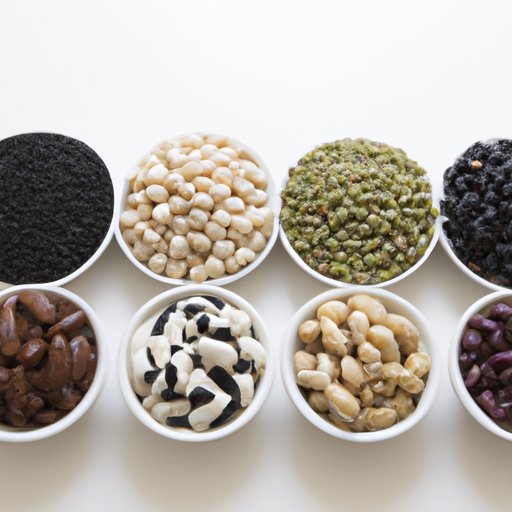Introduction
Proteins are essential nutrients that play a vital role in overall health and wellbeing. They’re made up of amino acids, which help build cells, create hormones and enzymes, and form antibodies to fight off infections. While proteins can be found in a variety of foods, beans are one of the most popular sources. There are many different types of beans, each with its own unique nutrition profile. In this article, we’ll explore the protein content of common bean varieties and provide tips for maximizing your protein intake with beans.

Comparison of Protein Content in Common Bean Varieties
Not all beans are created equal when it comes to protein content. Here’s a look at some of the most popular types of beans, their protein content per cup, and other nutritional information:
Lentils
Lentils are a great source of plant-based protein. One cup of cooked lentils contains 18g of protein. Lentils are also high in fiber, iron, folate, and potassium.
Pinto Beans
Pinto beans are a staple in many cuisines around the world. One cup of cooked pinto beans contains 15g of protein. They’re also high in fiber and other essential vitamins and minerals.
Black Beans
Black beans are another popular type of bean. One cup of cooked black beans contains 15g of protein. Black beans are also high in fiber, manganese, magnesium, and phosphorus.
Chickpeas
Chickpeas, or garbanzo beans, are a great source of plant-based protein. One cup of cooked chickpeas contains 14g of protein. Chickpeas are also high in fiber, iron, folate, and potassium.
Beans: A High-Protein Superfood
Beans offer a host of health benefits, including a boost in protein. When compared to other protein sources, beans have a slightly lower amount of protein per serving, but they are packed with other essential nutrients. For example, one cup of cooked black beans contains 15g of protein and 45g of carbohydrates, while a 3-ounce serving of beef contains 21g of protein and 0g of carbohydrates.
In addition to providing an excellent source of plant-based protein, beans are also rich in dietary fiber, which is important for maintaining a healthy digestive system. They’re also high in essential vitamins and minerals, such as iron, folate, and magnesium. Eating beans can also help lower cholesterol levels, reduce the risk of heart disease, and regulate blood sugar levels.
How to Maximize Your Protein Intake with Beans
You can get the most out of beans by incorporating them into your meals. Here are some tips for getting the most protein out of your bean-based meals:
- Add beans to salads, soups, stews, and chili.
- Substitute beans for meat in tacos, burritos, and wraps.
- Make hummus with chickpeas and tahini.
- Create a vegetarian chili using lentils, black beans, and pinto beans.
- Make a veggie burger with black beans and quinoa.
The Best Protein-Rich Beans for Vegetarians
Legumes are a great source of plant-based protein for vegetarians and vegans. There are many different types of beans that can provide a good source of protein for those who don’t eat animal products. Some of the best beans for vegetarians include lentils, chickpeas, black beans, and pinto beans.
It’s important for vegetarians and vegans to make sure they get enough protein from plant-based sources. Eating a variety of beans can help ensure you get all the essential amino acids your body needs. Other plant-based proteins include nuts, seeds, tofu, tempeh, and quinoa.
Protein Power: A Guide to the Most Protein-Dense Beans
When it comes to protein content, some beans are higher in protein than others. Here’s a look at some of the most protein-dense beans:
Soybeans
Soybeans are one of the highest protein-containing beans. One cup of cooked soybeans contains 28g of protein. Soybeans are also high in fiber, calcium, and magnesium.
Adzuki Beans
Adzuki beans are small, reddish-brown beans that are often used in Asian cuisine. One cup of cooked adzuki beans contains 16g of protein. Adzuki beans are also high in fiber, iron, and potassium.
Kidney Beans
Red kidney beans are a popular type of bean that’s often used in chili and other dishes. One cup of cooked red kidney beans contains 13g of protein. Kidney beans are also high in fiber and other essential vitamins and minerals.

What You Need to Know About Protein Content in Beans
When it comes to protein content in beans, there are several factors that can affect the amount of protein in a particular bean variety. These include the type of bean, how it’s cooked, and how long it’s been stored. It’s also important to note that some beans may contain higher amounts of protein than others, so it’s important to check the nutrition label before making your selection.
The recommended daily allowance for protein is about 0.8g per kilogram of body weight. This means that a person weighing 70kg should consume around 56g of protein per day. Eating a variety of beans can help you reach this goal. Aim to include at least one serving of beans in your daily diet, and consider adding some other plant-based proteins such as nuts, seeds, and legumes.
Conclusion
Beans are a great source of plant-based protein and other essential nutrients. Different types of beans have varying amounts of protein, so it’s important to choose the right beans for your needs. Eating a variety of beans can help you get the protein your body needs while also providing other essential vitamins and minerals. Remember to check the nutrition label before selecting your beans, and incorporate them into your meals for maximum protein power.


